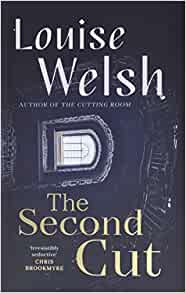In my review of the first Rilke novel, The Cutting Room, I observed how refreshing it was to have a main character who happened to be gay without this having to be, in some way, the point of the story. And I maintain that’s true. However, in her Afterword to the long-awaited sequel, The Second Cut, author Louise Welsh explains:
I wrote [The Cutting Room] in a white-hot rage, during the Keep the Clause campaign. The campaign objected to the repeal of Section 28… which made it an offence for schools and local authorities to “promote homosexuality”. The clause contributed towards intensifying an already hostile environment for LGBTQ+ people.
There are twenty years between the writing of these two novels, and that gap is reflected in the narratives’ timeframes, too, with the second novel set in 2022. Welsh notes that things have changed for the better in the intervening period: people can be open about their sexuality and gays on TV are no longer only there to provide the laughs. Section 28 is history and, indeed, many schools now happily debate LGBTQ+ issues. In The Second Cut we see progress, too. It begins with Rilke attending a gay wedding and while, before, he could be arrested for a late night assignation, it can now be arranged through Grindr, no fuss, little danger.
That’s not to say we’re living in a rainbow paradise, however, in either Welsh’s Glasgow or Rilke’s. In the novel we have a clash in George Square over trans rights after a TERF is engaged to speak at the City Chambers. A van full of police officers is on scene and you suspect violence is likely. Informed debate goes out the window. Prejudices remain. Don’t set aside your rage just yet.
And, although the Glasgow of The Second Cut is, in some respects, more enlightened than that of The Cutting Room, it is still a noir hinterland, peopled by (mostly) men with no scruples and a penchant for violence. The gothic menace that fuelled The Cutting Room remains, the idea that Rilke, very much an individualist with a healthy contempt for convention, is skating once more too close to danger. For all he can at times make himself unlikeable, you can’t help liking Rilke, and you wish he’d be a bit kinder to himself sometimes. But that would never do. Rilke isn’t going to soften any time soon.
In his second run-out, he is given a tip from friend JoJo about a house clearance in Galloway that could be lucrative and Rilke decides to take it on. Before he can, though, JoJo is dead, found on the streets of Glasgow and presumed to be a junkie dead of either an overdose or hypothermia. Both are common, neither provoke much interest from the authorities. But Rilke is suspicious. And a suspicious Rilke is incapable of keeping his nose out.
So begins a story which grows ever darker, taking in people smuggling, orgies, drug manufacture, organised crime. Rilke’s sense of honour forces him to do what he knows is reckless, and with every move he comes closer and closer to danger.
As you would expect, the story rattles along at a satisfying pace as we approach an inevitable denouement. It doesn’t disappoint.
Rilke remains one of the best creations in contemporary crime fiction, a man who is complex and uncompromising, utterly real. It’s a joy to make his acquaintance again, and I hope it’s not another twenty years before he’s back.

No comments:
Post a Comment